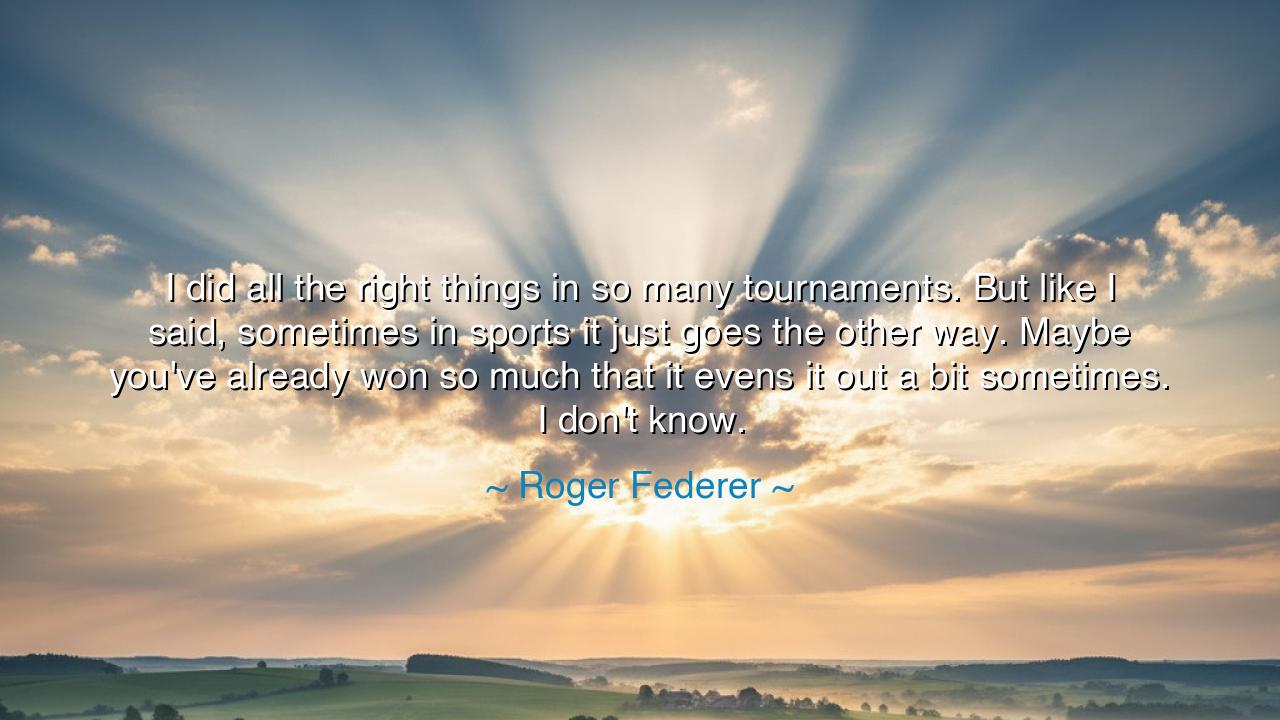
I did all the right things in so many tournaments. But like I
I did all the right things in so many tournaments. But like I said, sometimes in sports it just goes the other way. Maybe you've already won so much that it evens it out a bit sometimes. I don't know.






When Roger Federer reflected, “I did all the right things in so many tournaments. But like I said, sometimes in sports it just goes the other way. Maybe you’ve already won so much that it evens it out a bit sometimes. I don’t know,” he spoke as one who has lived upon the peaks of glory and tasted also the inevitability of loss. His words are not only about tennis, nor merely about sports—they speak of the rhythm of life itself, where victory and defeat weave together to form the full tapestry of human destiny.
The ancients would have recognized this wisdom. They believed in Fortune, that mysterious goddess who turns her wheel, raising one man to the heights while casting another down. Federer’s acceptance that “it just goes the other way” echoes this ancient truth: no matter how flawless the effort, no matter how disciplined the preparation, there comes a day when Fortune tilts the scales. Yet his words are not filled with bitterness, but with calm recognition, as though he has made peace with the dance of fate.
To say, “I did all the right things,” is to declare that effort was not lacking. Yet in sport, as in life, right action does not always guarantee the desired result. Here lies the humbling lesson: mastery of self and discipline of craft may prepare the ground, but the harvest is not always ours to command. This recognition keeps the heart from arrogance, reminding even the greatest champion that they are still human, still subject to forces beyond themselves.
History too gives us examples of this truth. Consider the great Carthaginian general Hannibal, who led his armies across the Alps to strike fear into the heart of Rome. In battle after battle, he did all the right things—outmaneuvering, outthinking, and outfighting his enemies. Yet in the end, Rome’s resilience, timing, and perhaps the balancing of Fortune itself overcame him. His brilliance did not vanish, but destiny chose another path. So too does Federer’s reflection remind us that victory is never guaranteed, even for the most gifted.
His musing, “Maybe you’ve already won so much that it evens it out a bit,” reveals a deeper humility. He suggests that life itself seeks balance—that those who have drunk often from the cup of triumph must also sip the bitterness of loss. This is not punishment, but equilibrium. The ancients would have called it Nemesis, the goddess who ensures that no mortal remains forever untouched by trial. Even the sun, at its zenith, must descend into night.
And yet, Federer’s words also carry comfort. For if defeat comes even when we have done all the right things, then we need not despair as though we are cursed or incapable. Loss does not erase effort, nor diminish character. Rather, it becomes part of the story, teaching patience, resilience, and gratitude. To win always would make us blind to the beauty of striving; to lose sometimes teaches us the worth of every hard-fought moment.
The lesson for us is clear: embrace both victory and defeat as necessary companions. Do not cling only to triumph, nor shrink from loss. Instead, do as Federer has done—accept both with grace, remembering that the true victory lies not in the score, but in the life shaped through discipline, perseverance, and humility.
Practically, this means striving with all your strength, yet releasing your heart from obsession with outcome. Give yourself to the contest, whether in sport, work, or life, and let Fortune decide her part. Celebrate your wins, learn from your losses, and above all, continue to play with dignity. For in the end, it is not the tally of victories alone that makes a life great, but the spirit with which you walk both in sunlight and in shadow.
Thus, Roger Federer’s words shine as timeless wisdom: do all the right things, yet accept that sometimes the outcome belongs to forces beyond you. This is not defeat, but freedom—the freedom to strive without fear, to lose without despair, and to live with the grace of one who knows that both triumph and failure are gifts upon the journey.






AAdministratorAdministrator
Welcome, honored guests. Please leave a comment, we will respond soon